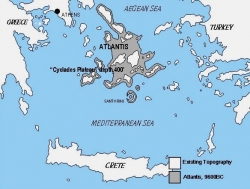Atlantis Was in the Mediterranean Sea, New Study Shows
An American researcher exposes the location of Plato's legendary island and discusses how close the scientific community previously came to solving this mystery.

Atlanta, GA, November 15, 2013 --(PR.com)-- Contrary to a common belief that Plato’s Atlantis may have been located somewhere in the Atlantic Ocean, Christos A. Djonis, researcher and author of a new book titled, "Uchronia?-Atlantis Revealed," says that analysis of Plato’s work revealed convincing evidence that the legendary island was in the Mediterranean and just few kilometers north of the Greek island of Santorini.
More precisely, he says, 11,000 years ago when, according to Plato, the story of Atlantis took place, many of the Cyclades Islands were connected by a flat terrain, today called the “Cyclades Plateau.” This now 400 foot underwater plateau formed the body of a large island, while the modern islands of Cyclades fashioned mountains that emerged in all the “right places” when they are compared to Plato’s story. The northern portion of this island was comprised of mountains which reached the shores. There is an oblong valley directly below this mountainous region and a second valley closer to the center of the island that is two-thirds the size of the oblong valley. Moreover, Santorini, a setting of an island within an island and a place where many scholars in the past had placed the crown-city of Atlantis, falls within 9 kilometers from the Grand Island, just as Plato claimed.
Mr. Djonis further explained that while several researchers previously had suggested Santorini could have been the spot where the crown city of Atlantis once stood, since no one believed that Plato’s story could have taken place more than 10,000 years ago, they concentrated their study during the Minoan era, and close to the time when the Santorini volcano erupted, around 1600 BC. The problem with that partial discovery, Mr. Djonis added, was that without the primary island of Atlantis nearby, Santorini alone did not match Plato’s whole description. This allowed for many people to doubt the particular find and to continue to question the validity of Plato’s story. According to Mr. Djonis, the recent archaeological discoveries of Gobekli Tepe in Turkey (circa 10000 BC), and the find of a 10,000-year-old sunken city off the coast of West India in the Gulf of Cambay, established that 10 millennia ago, humans were significantly more advanced than previously thought. These discoveries, he added, not only validated Plato’s testimony, but made the search for Atlantis around 9600 BC more acceptable.
In his yet to be published work, Mr. Djonis also explains that Atlantis was lost due to the rise of the seas after the last Ice Age, and more specifically, during the Mediterranean flood cycle that immediately preceded the flood of the Black Sea around 8000 BC. This worldwide cataclysm, he says, did not only destroy Atlantis but also wiped out other coastal civilizations around the world, such as the sunken city off the west coast of India.
For more information, visit www.AtlantisIslandRevealed.com or http://youtu.be/ok7PphlD9mw
More precisely, he says, 11,000 years ago when, according to Plato, the story of Atlantis took place, many of the Cyclades Islands were connected by a flat terrain, today called the “Cyclades Plateau.” This now 400 foot underwater plateau formed the body of a large island, while the modern islands of Cyclades fashioned mountains that emerged in all the “right places” when they are compared to Plato’s story. The northern portion of this island was comprised of mountains which reached the shores. There is an oblong valley directly below this mountainous region and a second valley closer to the center of the island that is two-thirds the size of the oblong valley. Moreover, Santorini, a setting of an island within an island and a place where many scholars in the past had placed the crown-city of Atlantis, falls within 9 kilometers from the Grand Island, just as Plato claimed.
Mr. Djonis further explained that while several researchers previously had suggested Santorini could have been the spot where the crown city of Atlantis once stood, since no one believed that Plato’s story could have taken place more than 10,000 years ago, they concentrated their study during the Minoan era, and close to the time when the Santorini volcano erupted, around 1600 BC. The problem with that partial discovery, Mr. Djonis added, was that without the primary island of Atlantis nearby, Santorini alone did not match Plato’s whole description. This allowed for many people to doubt the particular find and to continue to question the validity of Plato’s story. According to Mr. Djonis, the recent archaeological discoveries of Gobekli Tepe in Turkey (circa 10000 BC), and the find of a 10,000-year-old sunken city off the coast of West India in the Gulf of Cambay, established that 10 millennia ago, humans were significantly more advanced than previously thought. These discoveries, he added, not only validated Plato’s testimony, but made the search for Atlantis around 9600 BC more acceptable.
In his yet to be published work, Mr. Djonis also explains that Atlantis was lost due to the rise of the seas after the last Ice Age, and more specifically, during the Mediterranean flood cycle that immediately preceded the flood of the Black Sea around 8000 BC. This worldwide cataclysm, he says, did not only destroy Atlantis but also wiped out other coastal civilizations around the world, such as the sunken city off the west coast of India.
For more information, visit www.AtlantisIslandRevealed.com or http://youtu.be/ok7PphlD9mw
Contact
Book: "Uchronia?-Atlantis Revealed"
Christos A. Djonis, Author
678-776-1931
www.AtlantisIslandRevealed.com
Christos A. Djonis, Author
678-776-1931
www.AtlantisIslandRevealed.com
Categories
